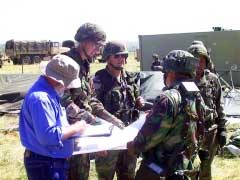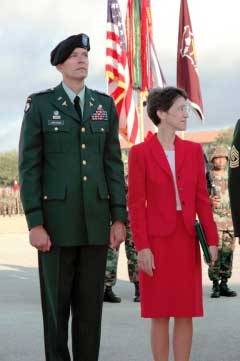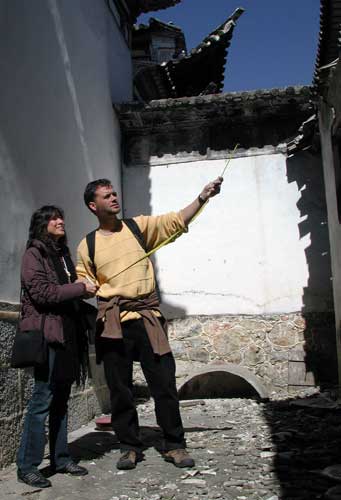William Hartman, the current Director of Nursing Support at Door County Memorial Hospital could have chosen to work as a nurse in a Philadelphia hospital when he graduated from Misericordia University in 1979 – instead he chose to treat wounded soldiers as part of an elite medical team.
Published: Hunlock Creek native determined to save soldiers’ lives during war
March 15, 2010

Col. William J. Hartman, R.N., M.S.N., A.N.P., second from left, reviews with a civilian engineer plans for field testing the Medical Re-engineering Initiative that was designed to develop a better, more versatile combat support hospital. The field test occurred at Fort Carson, Colo. - Courtesy of Misericordia University
And one decade later he found himself jumping out of a Chinook helicopter into the middle of the first day of ground fighting in Operation Desert Shield in 1990 as part of an elite medical team. In the midst of the fighting, Hartman immediately began to treat wounded soldiers.
“It was scary, but at the same time we were determined to make it happen,” Hartman, now a retired Army colonel, says.
The Hunlock Creek native was part of a new Forward Area Surgical Team that changed the military’s approach to emergency medical treatment by getting skilled medics on the field with the injured soldiers to provide immediate medical treatment – even as battle continues around them. The nine-member teams were dropped into combat zones with equipment and expected to set up camp immediately.
Hartman received the Combat Medical Badge for performing medical services under direct enemy fire in the Middle East with the 101st Airborne Division. He was also deployed to Somalia with the 86th Evac Hospital in 1993 during the middle of a bloody civil war where he provided “non-stop trauma care.”
“I took the nursing role and I was able to experience it in ways I couldn’t have in a hospital,” he says.
Hartman’s work in the field directly saved soldiers and civilian lives, his later administrative roles expanded his touch to potentially every soldier currently serving today and a multitude of hospitals, universities and health care programs across the nation.
During 27 years in the military, Hartman moved up from a second lieutenant in the Army Nurse Corps and held positions including chief nurse of the Reserve Officers’ Training Corps, where he developed programs to help ROTC nursing students excel. As deputy commander at the 10th Combat Support Hospital at Fort Carson, Colo., he helped test a new combat hospital system still being used by the Army and finally becoming chief of the Department of Training Support.
As the chief, Hartman oversaw field and equipment training, testing and wrote how-to-manuals for soldiers studying medicine.
Hartman says he was also instrumental in converting textbooks and manuals into digital formats that soldiers across the world can access today, providing on-demand resources for further education and just-in-time mission specific training.
“We positioned ourselves to provide any soldier deployed throughout the world with quality education resources just like if they were back at the schoolhouse,” Hartman writes. “As troop deployments increased for Iraq and Afghanistan, just-in-time training became very important and DTS provided that important link to ensure every soldier, from doctors to medics, possessed the knowledge and abilities to perform effectively and safely within any environment.”
Hartman now lives with his wife of 28 years, Marilyn, in Wisconsin and works as the Director of Nursing Support at Door County Memorial Hospital. He acknowledges that he has moved far away from his roots and parents, who still live in Hunlock Creek, PA and it was a chance occurrence that got him started on his path.
One snowy day at a college career fair, Hartman snagged an ice-scraper from the Army recruiter’s box of free promotional items. They struck up a conversation, and as Hartman says, “the rest is history.”
“Sometimes you can’t plan it,” he says. “Sometimes you have to be open and accept it as it comes along.”




